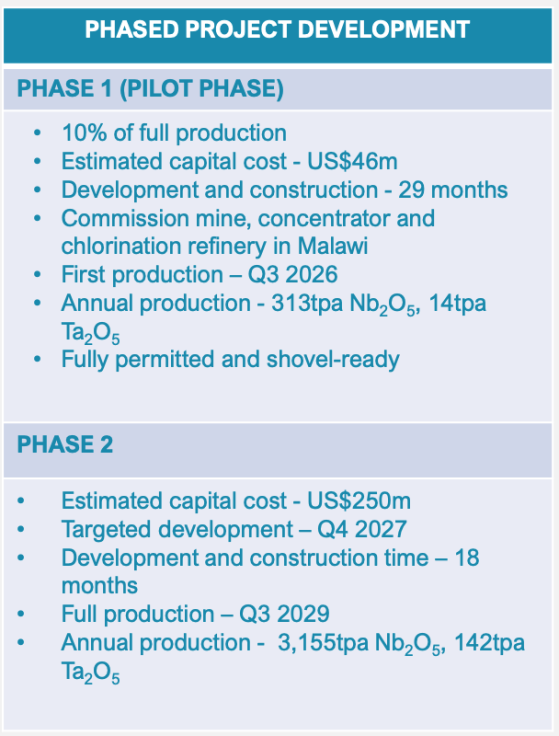Emerging vertically-integrated niobium producer Globe Metals & Mining Ltd (ASX:GBE) is developing a globally significant niobium mine in Malawi — the Kanyika Niobium Project — a well-advanced and development-ready project that’s on track to be the first globally significant niobium mine in 50 years.
Currently, three mines account for more than 95% of the global mined niobium supply and no new mines have been brought into production for at least 50 years, so the development of Kanykia offers mitigation against potential supply risk.
Globe is aiming to be the second vertically integrated niobium oxide player globally, with its development being of key economic importance to the Western World which has significant dependency on imports.
Why is niobium so important?
Niobium features on the critical metal lists of the US, EU, Japan, India and Australia.
The critical metal is in demand thanks to its distinct properties, which include exceptional heat resistance, corrosion resistance, strength, weldability and lightweight characteristics. It is used in practically everything from wind turbines, jet engines, aeroplane bodies, high-pressure pipelines, superconducting magnets, nuclear power, batteries and the defence industry.
Niobium has significant economic importance, especially given its substantial dependency on imports as Brazil dominates global supply.
The following market trends highlight the need for new niobium supply.
Rising demand
The rise in urbanisation in Asia, particularly in China and India, is expected to drive increased consumption of niobium. The expanding middle classes in these countries will lead to higher demand for healthcare technologies, such as magnetic resonance imaging (MRI) machines.
This shift is indicative of a broader trend where increased prosperity fuels demand for advanced technologies and medical equipment.
The integration of artificial intelligence (AI) is poised to revolutionise data analysis, Industry 4.0 and robotics, thereby driving demand for capacitors in data centres.
A renewed Space Race is also expected to increase the need for superalloys, driven by a surge in satellite production.
Concurrently, environmental, social and governance (ESG) concerns are likely to bolster the demand for renewable energy technologies, further enhancing the need for thermopower technology and materials such as superalloys.
Supply chain risks
Brazil's dominant position in the global niobium market — boasting only three major players worldwide — presents significant supply chain risks. This dominance has prompted the US and Europe to explore alternative sources of niobium. China has responded by investing in Brazilian firms to diversify its supply.
For the US, establishing partnerships with niobium-rich regions, including Canada, Africa and Europe, is crucial for maintaining aerospace and national security capabilities.
Kanyika Project optimisation
An optimisation study for the project in central Malawi underscored key financial metrics and a refined development approach. The company’s optimisation strategy consists of three aspects — the development of the Kanyika Project in two phases; development of the planned refining process; and construction of a refinery in Malawi.
Globe plans to produce a pyrochlore mineral concentrate containing niobium and tantalum for advanced processing. The company expects to kick off project execution by the end of this year, with construction starting in early 2025.
The project has a projected internal rate of return (IRR) of 47% and a net present value (NPV) of US$1 billion.
Globe emphasised its unique point of difference being its focus specialty oxide markets. It outlined the following project features:
Test work and pilot plant
Globe has achieved significant milestones in its project's advancement, emphasising sustainability, efficiency and progress towards commercialisation:
- Niobium/tantalum extraction and separation - Globe has employed environmentally sustainable chlorination refining, ensuring radiation-free products by effectively removing radioactive materials. It achieved more than 94% extraction and separation of key rare earth elements (REE).
- Refinery pilot plant construction and offtake agreements - Constructing a refinery pilot plant to produce marketing samples, finalising offtake agreements.
- Flotation economic optimization test work - Successfully completed test work, selecting reagents for refining.
- Production of concentrate feedstock - Initiated concentrate feedstock production for Globe's chlorination refinery pilot plant, utilising low-impact technology
Globe’s high-purity niobium oxide products will be sold into the speciality metals markets, realising premium prices over the ferroniobium market.
To deliver on its plans, the company now has “a firm handle” on the total funding requirements to deliver Phase 1 first production and has formulated an accompanying funding strategy that aims to minimise shareholder dilution.
In late July the company received a letter of intent from Ecobank Malawi Ltd for a US$15 million loan facility that will materially de-risk the Kanyika Project.
Project milestones
Looking ahead, Globe has outlined the following planned project milestones at the Kanyika Project:
Read more on Proactive Investors AU
